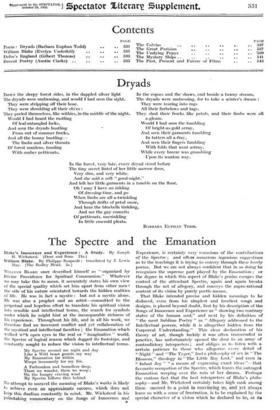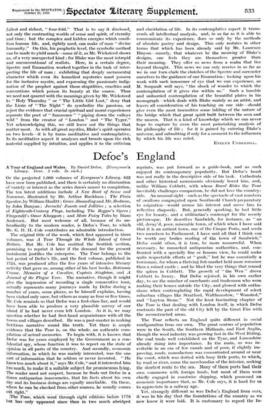The Spectre and the Emanation
Blake's Innocence and Experience : A Study. By Joseph H. Wicksteed. (Dent and Sons. 21s.)
William Blake. By Philippe Soupault : translated by J. Lewis May. (The Bodley Head. 5s.) NVILLIAM BLARE once described himself as " organized by Divine Providence for Spiritual Communion." Whatever we may take this to mean, it accurately states his own view of the special quality which set him apart from other men : the side of his nature orientated towards the hidden realities of life. He was in fact a mystic : but not a mystic alone. He was also a prophet and an artist—committed to the perpetual and hopeless effort to translate his spiritual vision into sensible and intellectual terms, the search for symbols under which he might hint at the incomparable richness of his experience. Throughout his life, and in all his work, we therefore find an incessant conflict and yet collaboration of the mystical and intellectual faculties; the Emanation which walked w?-11 open eyes in the real or " imaginative " world, the Spectre of logical reason which dogged its footsteps, and constantly sought to reduce the vision to intellectual terms.
My Spectre around me night and day Like a Wild beast guards my way My Emanation far within Weeps incessantly for my Sin.
A Fathomless and boundless deep, There we wander, there we weep ; On the hungry craving wind My Spectre follows thee behind.
No attempt to unravel the meaning of Blake's works is likely to achieve even an approximate success, which does not keep this dualism constantly in mind. Mr. Wicksteed in his Painstaking commentary on the Songs of Innocence and
-.a - Experience, is certainly very conscious of the contributions of the Spectre ; and offers numerous ingenious suggestions as to the teachings it is trying to convey through these lovely poems. But we are not always confident that in so doing he recognizes the supreme part played by the Emanation ; or the degree in which this aspect of Blake's genius escapes the control of the attendant Spectre, again and again breaks through the net of allegory, and conveys the supra-rational content of its vision by purely poetic means.
That Blake intended precise and hidden meanings to be deduced, even from his simplest and loveliest songs and designs, is placed beyond doubt, first by his description of the Songs of Innocence and Experience as " showing two contrary states of the human soul," and next by his definition of " the most Sublime Poetry " as " Allegory addressed to the Intellectual powers, while it is altogether hidden from the Corporeal Understanding." This clear declaration of his theory of art, though luckily it was often transcended in practice, has unfortunately opened the door to an army of contradictory interpreters ; and obliges us to listen with a certain patience to those who allegorize every detail of "Night" and "The Tyger," find a philosophy of sex in "The Blossom," theology in " The Little Boy Lost," and even in " Infant Joy " " a means of expressing exact ideas "—that favourite occupation of the Spectre, which leaves the outraged Emanation weeping over the ruin of her dream. Perhaps the curious fact that the best interpreters of Blake's philo- sophy—and Mr. Wicksteed certainly takes high rank among these—succeed to a point in convincing us, and yet always leave us with a sense of frustration, is to be explained by the special character of a vision which he declared to be, at its
fullest and richest, " four-fold." That is to say it disclosed, not only the contrasting worlds of sense and spirit, of eternity and time; but the complex and hidden energies which condi- tion human life, and, rightly used, can make of man " divine humanity." On this, his prophetic level, the symbolic method can be made to yield much—some 6f it, as Mr. Wicksteed shows us, of a very unexpected kind ; for Blake was the most intrepid and unconventional of realists. Here, in a certain degree, Spectre and Emanation worked together in the task of inter- preting the life of man ; exhibiting that deeply sacramental character which even its homeliest mysteries must possess for the inclusive mystic, and expressing the passionate indig. nation of the prophet against those stupidities, cruelties and conventions which poison its beauty at the source. Thus we need not quarrel with the meanings given by Mr. Wicksteed to " Holy Thursday " or " The Little Girl Lost," deny that the Lions of " The Night " do symbolize the passions, or reject the evidence that crucial spiritual and moral experiences separate the poet of " Innocence " " piping down the valleys wild " from the creator of " London " and " The Tyger." Yet acknowledging this, we still leave out the things that matter most. As with all great mystics, Blake's spirit operates on two levels—it is by turns meditative and contemplative. In its meditative aspect it analyses and broods upon the rich material supplied by intuition, and applies it to the criticism and elucidation of life. In its contemplative aspect it trans- cends all intellectual analysis, and, in so far as it is able to communicate its experience, does so only by the methods of absolute poetry and design. This only restates in other terms that which has been already said by Mr. Laurence Binyon—namely, that whatever be the meaning of Blake's designs, one feels they are themselves greater than their meaning. They offer us news from a realm that lies beyond thought. This news we can only receive in so far as we in our turn elude the clutches of the Spectre and surrender ourselves to the guidance of our Emanation ; looking upon his work with such innocence of eye that we can experience, as M. Soupault well says, "the shock of wonder to which the contemplation of it gives rise within us." Such a humble and unhurried contemplation of the beautiful plates in his monograph--:which deals with Blake mainly as an artist, and leaves all consideration of his teaching on one side—should give even the most insensitive some inkling of the nature of the bridge which that great spirit built between the seen and the unseen. That is a kind of knowledge which we can never hope to capture by even the most painstaking analysis of his philosophy of life ; for it is gained by entering Blake's universe, and submitting if only for a moment to the influences by which his life was ruled.
EVELYN UNDERHILL.































































 Previous page
Previous page